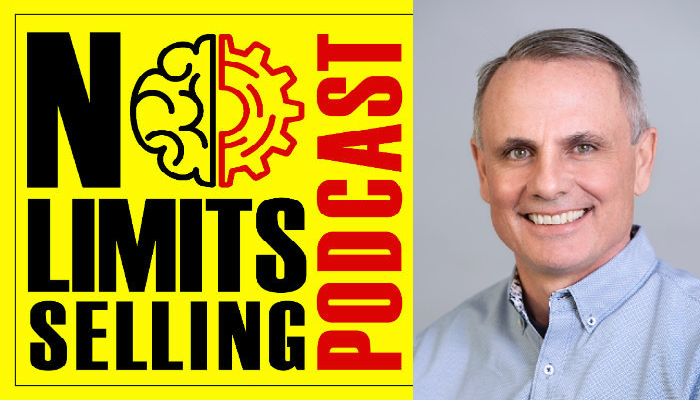Mike Thorne on Building Your Tribe
On Episode 192 of The No Limits Selling Podcast, we have Mike Thorne. Mike is a current Chair of a Vistage CEO Group in the New Hampshire/Maine area where he facilitates a group of 12 -16 small/midsize businesses in Northern New England helping them become better leaders, making better decisions, and delivering better results.
In this episode, Mike shares with us tips on how to build your tribe.
For most of his career, he was working in manufacturing companies in business development, and then the last 15 years as President of Russell Athletic Team Sports, President of Yankee Candle, and most recently CEO of Challenger Turf. All made-in-the-USA brands and businesses. Mike’s passions are Family, Adoption, and Foster Care (Chair–Elect for the NCFA, National Council for Adoption where we are the leading advocacy, education, and research source for adoption), Adventure events (Just finished the Ironman70.3 in Maine), being outdoors and around water. His Mission is to restore human dignity to unleash greatness in people. He is a transformer of people and organizations using Personal Trust Communities to accomplish this.

Contact Mike:
[EDITOR’S NOTE: This podcast is sponsored by No Limits Selling. It is a fun, fast-paced podcast that delivers hard-fought business advice that you can implement today to improve your sales and performance]
Interested In Our Real Estate Coaching Services? Explore Our Website: Link
Feeling Not Well Today? You Can Use Our Mindset Boosters App To amp Up Your Mood: Link
Find us on Social Media:
LinkedIn | Facebook community | Instagram
Like what do you listen to? Subscribe to our podcast!
Ready to become fearless? We can help you become fearless in 60 days so you accomplish more in your career Schedule A 15 min Call with Umar
Summary
Introduction and Background
The podcast begins with an introduction of Mike Thorne, who is currently the Chair of a Vistage CEO Group in the New Hampshire/Maine area. He has a rich background in business leadership and has served as a CEO himself. His passion lies in helping other CEOs and business leaders succeed.
Mike's Journey and Role in Vistage CEO Group
Mike shares his journey from his early career to his current role. He discusses his experiences and the lessons he learned along the way. He provides an overview of the Vistage CEO Group, its mission, and how it helps CEOs and business leaders. As a Chair, Mike facilitates the group's activities and helps members navigate their challenges.
Advice for CEOs and Business Leaders
Mike shares his advice for CEOs and business leaders on how to build your tribe, drawing from his own experiences and the insights he has gained from leading the Vistage CEO Group. He emphasizes the importance of understanding how everyone is hardwired and what inspires them. He also highlights the significance of listening to your team and asking them questions, which often leads to them realizing their own solutions.
Mind Hack for Happiness and Productivity
Mike shares a mind hack that he uses to be happier and more productive. He recommends using the Five Minute Journal, a simple tool that helps you start your day by focusing on what you are grateful for and what you want to happen. At night, you reflect on the same things. This practice helps to start the day with a positive mindset instead of worrying about what's going on.
Challenges in Growing Practice
Mike discusses the three biggest challenges he faces in growing his practice and shares this advice to help you build your tribe. The first challenge is finding CEOs and business owners who are ready to grow personally and professionally. The second challenge is building out a personal trust community and sharing that with business leaders. The third challenge is helping leaders navigate the ongoing impacts of the Coronavirus pandemic and figuring out the path forward.
Conclusion
In this podcast, Mike Thorne, the Chair of a Vistage CEO Group in the New Hampshire/Maine area, shares his insights and experiences from his journey as a business leader. To build your tribe, he emphasizes the importance of understanding individual motivations and hardwiring in a team, and the value of asking questions to encourage self-realization. He also shares a personal mind hack for happiness and productivity, which involves daily gratitude and goal-setting practices.
Thorne discusses the challenges he faces in growing his practice, including finding ready-to-grow CEOs, building a personal trust community, and navigating the ongoing impacts of the Coronavirus pandemic. The podcast encapsulates Thorne's commitment to fostering growth and success in other CEOs and business leaders, and his belief in the power of understanding, communication, and resilience in the face of challenges.
Questions & Answers
Who is Mike Thorne?
What is the Vistage CEO Group?
What advice does Mike Thorne offer to CEOs and business leaders?
What is the Five Minute Journal and how does it contribute to happiness and productivity?
What are the challenges Mike Thorne faces in growing his practice?
What is Mike Thorne's perspective on the future of business leadership?
Don’t miss this opportunity to transform your real estate career with one-on-one coaching. As an experienced real estate coach, I, Umar Hameed, am dedicated to helping you unlock your full potential and achieve your real estate goals. To learn more about who am I and my clients ↓
If you’re ready to take the next step, book an appointment with me today and begin your journey toward success in the real estate industry.
